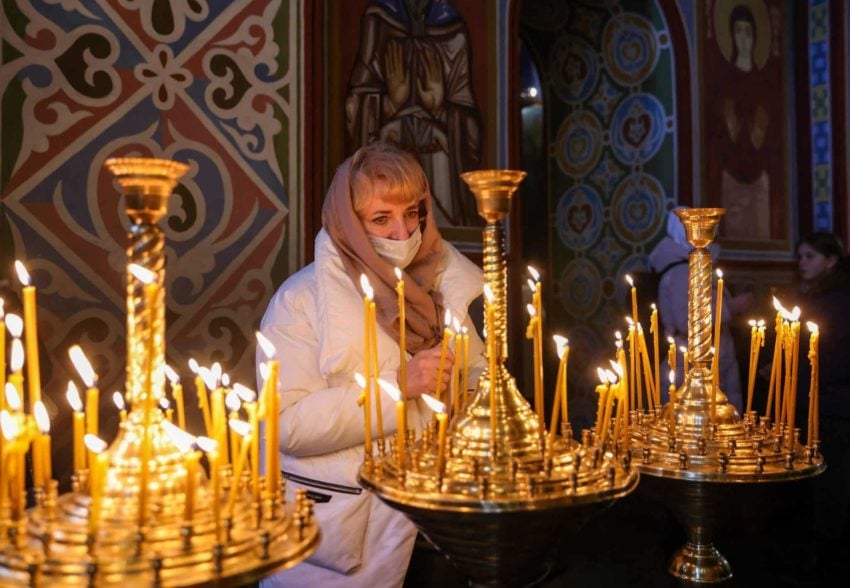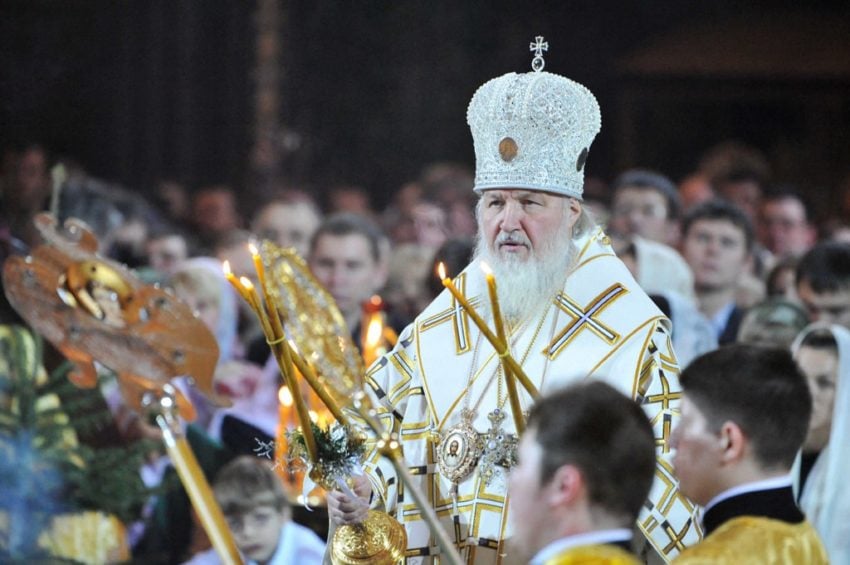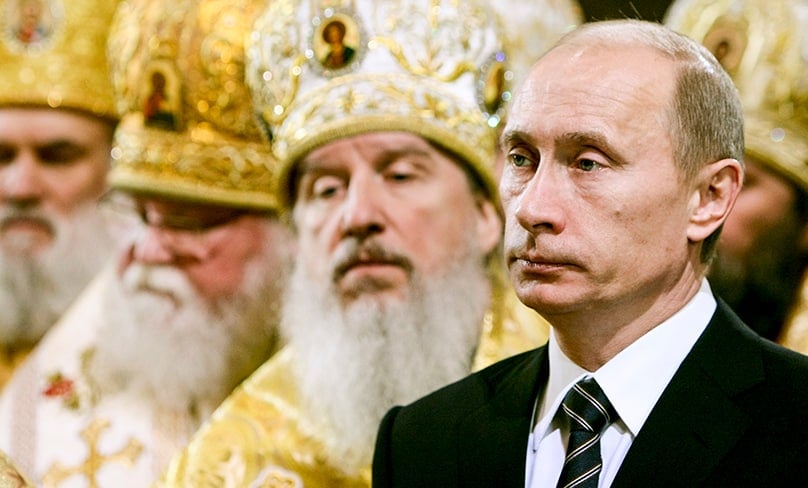
As war broke out in Ukraine the Ecumenical Patriarch of Constantinople, His All-Holiness Bartholomew, wrote directly to our own Ukrainian Catholic Patriarch Sviatoslav Shevchuk to offer his fraternal support and prayers.
As Sviatoslav wrote in response to this gesture, “We see that in the face of death, in the face of brutal military force, every church schism and division falls, and we all unite in the name of God and the good of the person”.
I think this is a worthwhile thing to reflect upon for Catholics. At a time of true crisis, spiritual divisions are shown for what they truly are: indulgences of the worst sort, as in the vice of indulgence, something unhealthy for the life of the soul of the Christian world. And we’ve all indulged ourselves on both sides of the great divide.
Three important stories have to be told at a time of war, such as this.
Ukraine in search of communion
The first is about Ukraine, where the population is overwhelmingly Orthodox.Two Orthodox jurisdictions operate in Ukraine: the Patriarchate of Moscow, which calls itself The Ukrainian Orthodox Church (UOC-MP), and the self-governing, or autocephalous, Orthodox Church of Ukraine (OCU-EP).
The Orthodox Church of Ukraine was recognised in 2019 by the Ecumenical Patriarch of Constantinople to howls of protest from Moscow, which then broke communion with the Ecumenical Throne. Although the UOC is a newly-minted community, it was assembled out of more ancient parts by the issuing of a Tomos (an official proclamation) of Autocephaly.
By granting it autocephaly, His All-Holiness Bartholemew pointed to a much older story about the founding of Christianity in Kyivan Rus in 988, and the Byzantine mission to the Slavs. Of course, Moscow wasn’t even on the map when that happened.
Alongside the actions of the Ecumenical Throne, the Orthodox Church of Ukraine and the Ukrainian Greek Catholic Church have become very close as we recognise our common foundation in the baptism of Kyivan Rus by the Holy Church of Constantinople, our common mother.
A broader ecumenical vision
Catholics tend to think of ecumenism through the frame of the Reformation, while the division between the Orthodox and Catholic churches has historically been perceived as a division within the Great Church of Christ.
In Ukraine this ecumenical vision is expressed forcefully and truthfully at the grassroots level through the many ecumenical dialogues, theological working groups, and common solidarity between the Greek Catholic and Orthodox laity.
More significant is the quiet, steady, pursuit by the Churches of Kyivan heritage with the Ecumenical Throne of an architecture to re-establish official communion, sensitively examining questions of primacy and whether a unified Ukrainian Patriarchate – Greek Catholic and Orthodox together – might be possible.
Ukrainian civil society plays a role here too, because throughout the trajectory of its history it has always been pluralistic. There were always Ukrainian Greek Catholics, Roman Catholics, Orthodox, Jews, Muslims and many other confessions besides.
Ukrainians have always rubbed shoulders with various groups that were not part of their own intimate community, finding ways to work creatively within that context over many centuries.
This was obvious in the 2014 Revolution of Dignity on the Maidan, demonstrating the desire of Ukrainians to embrace what I would regard as the best European ideals of freedom, of liberty, of dignity, of respect for difference.
Russia’s glorious isolation is pure mythology

The second story is about Russia, and particularly about the relationship between paranoia, power and isolation. I was having a little joke with a friend of mine, a Priest of the Moscow Patriarchate, who said, “Oh no, Father. The thing with Russia is we don’t object to Primacy. It’s just that we don’t have it. If we did, you’d know about it.”
There is no primacy as immediate, as crushing as the primacy exercised by the Primacy of Moscow in the territories it controls. The Russian Church exists in a kind of hermeneutical loop, a terrarium of their own creation, especially since the Patriarchate of Kiril Gundyayev.
A changing Russian Church
The Russian Church was not always so authoritarian. Prior to the Bolshevik revolution the Russian Church was in many ways a font of the most creative theology and liberality within Orthodoxy.
Consider the artistic, philosophical and theological flowering of the late 19th century silver age, which gave us towering figures like Fyodor Dostoevsky and the prophetic Vladimir Solovyov, and which had its influence on the life and dynamism of the Russian Church.
By 1917 the remarkable Patriarch Tikhon Belavin called an All-Russian Council to propose a remarkable program of reform for the Russian Church, which had become brittle and extremely tired, yoked as it was to the civil administration of the Russian Empire.
Soviet domination caused all this to be abandoned, of course. The intellectuals who survived the Bolshevik purges were exiled on the famous “philosophy steamer” of 1922 and in places like Paris and New York found themselves at liberty to pursue, probably for the first time, new ideas about Orthodox life.
After the 1917 Revolution, diverse groups emerged from the Russian Church. The Russian diaspora was defined by plurality and division. There were the Soviet puppet “Living Church” in Russia, the Catacomb church persecuted by the Bolsheviks, the intellectual diaspora in Paris, as well as the New York-based Metropolia that merged into the Orthodox Church of America, and of course the “conservative rump” of Russian Christianity, the Russian Orthodox Church Outside of Russia (ROCOR).
The big task for Russian Orthodoxy was to draw all this back together after the collapse of the Soviet Union. It’s very interesting that ROCOR, which considered Moscow to be the Antichrist during the Soviet years, now finds itself in quite a comfortable relationship with the Moscow Church – a kind of marriage made in hell. I would argue that the Russian church has just not been able to reappropriate and process its history, and especially the most creative parts of its legacy, because it remains yoked to the toxic ideology of total interpenetration of Church and State – Russia’s old, old problem.
In one sense the Putinists have a gripe with Ukrainians simply because, after the collapse of the Iron Curtain, they desired independence and through sheer grit and happenstance of history, got away with it.
Ordinary Russians are modern Europeans, connected to the modern world – as they are finding out with the financial and diplomatic sanctions levied against Putin. The idea of a hermetically-sealed “Russian world”, together with its Eurasianist mythology, is a fantasy.
Why do some Catholics support Putin?

The third story is for Catholics who find themselves reading this war through the lens of the culture wars of the immediate past, and who imagine Putin as a combatant in an almost “cosmic” war of woke versus antiwoke, or integralist Catholicism versus modernism.
Vladimir Solovyov, the prophetic theologian whose book Russia and the Universal Church really underlies this whole situation, has much to teach these Catholics.
He thought the soul of modern man suffered from three temptations: to radical materialism and secularism, to the “Tolstoyan” morality of sentimentality and absurd pacificism, even to the point of refusing to defend the good; and most important, the craving for the Superman (Übermensch) of Friedrich Nietzsche.
In that last category alone he grasps something that has become truly our own experience of ourselves in late modernity, the desire to look to a Superman – one heroic figure of strength, determination and ruthlessness.
In the eyes of some Catholics, usually young men trying to find their way in life, Vladimir Putin represents just this person.
But who is he really? A violent dictator, the last of the Soviets. If you were to take the photographs of Putin, Lukashenka and their cronies and put them in black and white, you’d swear you were looking at goons from the Brezhnev era.
These men are dinosaurs and support for them can have no place among us if we wish to call ourselves Catholic Christians.
Fr Justin McDonnell is a Ukrainian Catholic Priest of the Eparchy of Sts Peter and Paul, Melbourne.
Related Articles:
